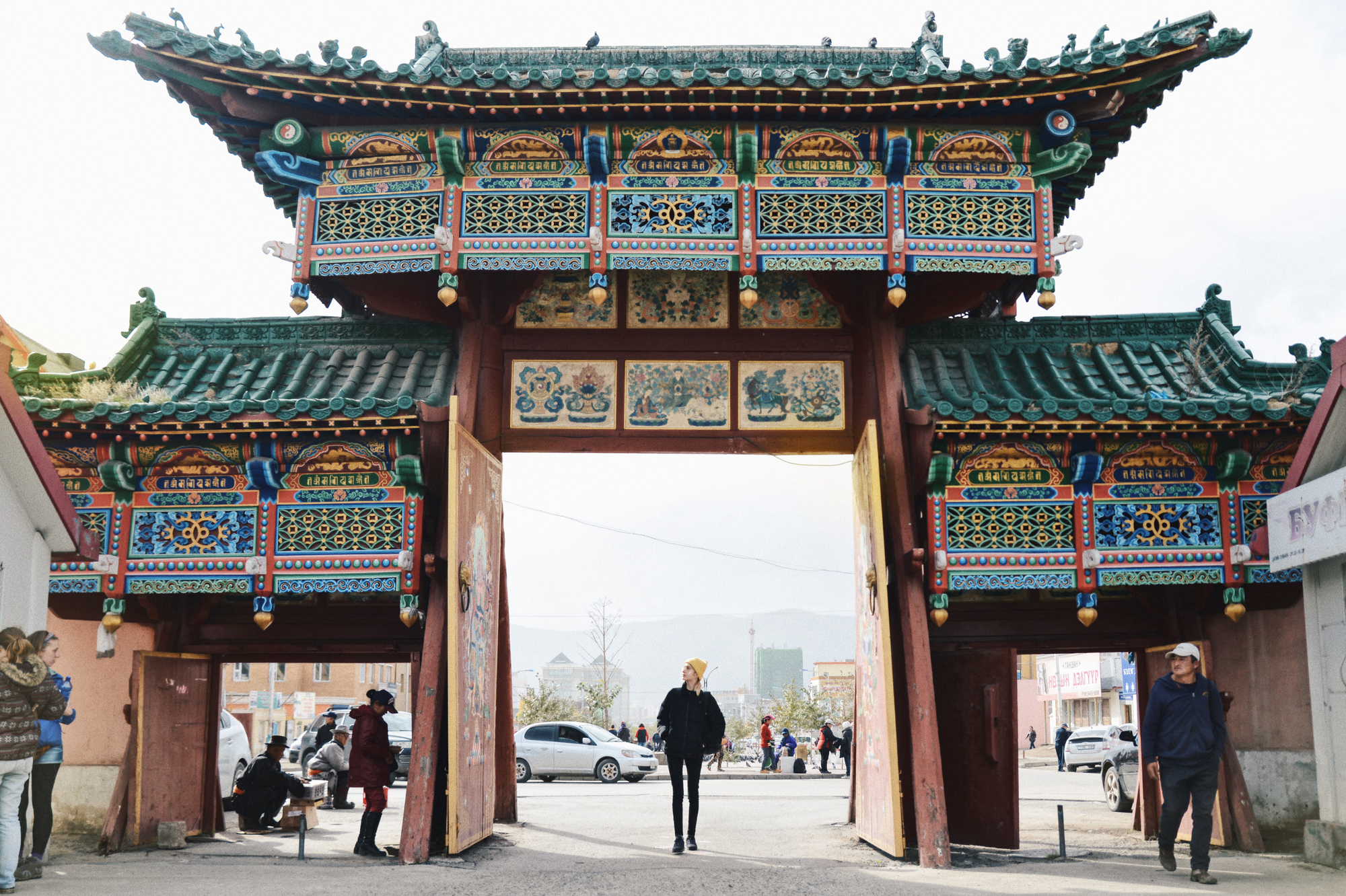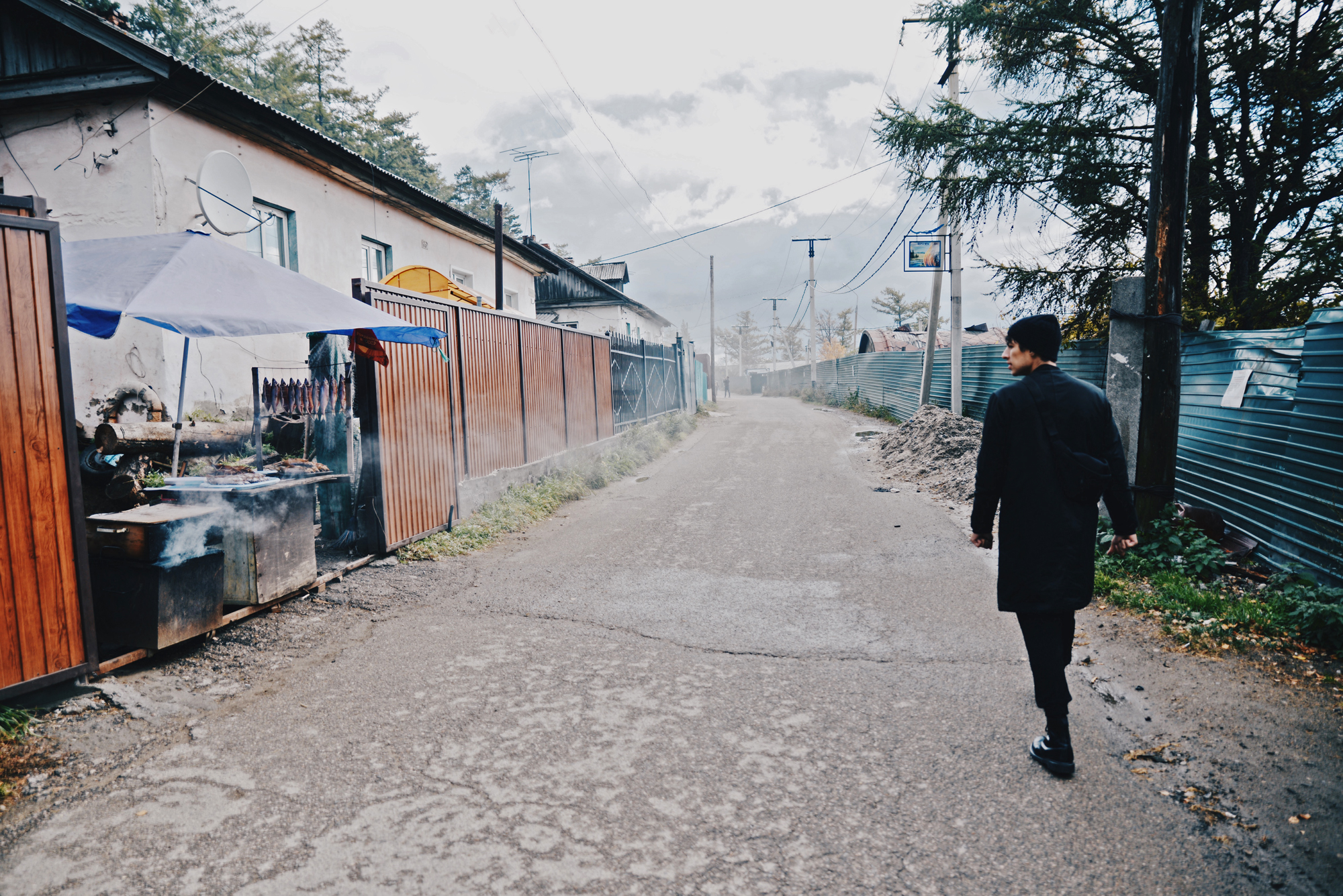Hörni. Äntligen ska jag få berätta för er om något av det bästa jag gjort.
Guys. Finally I gett to tell you about one of the best things I’ve ever experienced.
Vi hade besökt Moskva, levt i fyra dygn på tåget och övernattat i Irkutsk och fiskebyn Listvyanka. Efter en flera timmar lång passage längs med Baikalsjön stannades tåget och genomsöktes av mongolisk gränsbevakning. Det är märkligt hur nervös man blir varje gång man ska “granskas” av polis, även om alla pass och visum är på plats.
We had visited Moscow, lived for four days on the train and spent a night in Irkutsk. After a several hours long passage along Baikal Lake, the train was stopped and searched through by Mongolian border guards. It’s strange how nervous you get every time you are to be checked by the police, even though your passports and visas are in place.
I gryningen morgonen därpå var vi framme i Ulan Bator. Trötta och förväntansfulla tog vi oss in till stan.
At dawn the following morning we arrived in Ulan Bator, tired but excited.
Trots den tidiga timman och jetlagen som ständigt gjorde sig påmind åkte vi till Gandan-templet för att bevittna morgoncermonin.
Despite the early hour and our jetlag, we went to the Gandan Temple to witness the morning ceremony.
Ljudet av mumlande, nynnande och knarrande golv studsade mellan väggarna när templets besökare gick runt den stora guldstatyn i mitten.
The sound of mumbling, humming and creaking floors bounced between the walls when the temple visitors walked around the great gold statue in the middle.
Vi stannade på området i någon timme och fick bevittna många olika slags ceremonier i de olika byggnaderna. Precis innan vi lämnade smög vi in i en sal där de allra yngsta munkarna höll hus. De sjöng, drog varandra i kläderna och hade lika svårt att sitta still som barn alltid har. Att två nyfikna turister kikade in hjälpte inte precis koncentrationsförmågan, så vi gled därifrån ganska snabbt för att inte störa.
We stayed in the area for an hour and witnessed different kinds of ceremonies in the different buildings. Just before we left, we entered a hall where the youngest monks had gathered. They sang, pulled each other’s clothes and had just as big problems to sit still as children always have. The fact that two curious tourists peeked in didn’t just help the concentration level, so we left quite quickly to not disturb.
Jag skulle kunna skriva mycket mer om besöket i Ulan Bator, men för att undvika att göra detta inlägg till en roman väljer jag att att sammanfatta det kort: Jag gillade Ulan Bator väldigt mycket. Det är en märklig stad, många intryck påminde mig om peking, men utan trängseln och med mycket mer amerikanska influenser. Även om klyftorna i levnadsstandard var stora bland invånarna fick man ett generellt intryck av att människor var till freds och vänliga.
I could write much more about the visit in Ulan Bator, but in order to avoid making this post into a novel, I choose to summarize it like this: I liked Ulan Bator very much. It is a strange city, many impressions reminded me of Beijing, but not as crowded and with much more American influences. Although the gap in living standards was high among the inhabitants, I had a general impression that people were at peace and very friendly.
Efter en natt i Ulan Bator hämtades vi upp av Zero, en Mongolisk kille i min ålder som skulle guida oss i naturreservatet Gun Galuut de kommande dagarna. När vi körde ut ur staden passerade vi enorma förorter av skjul och nomad-tält, Zero berättade att urbaniseringen lett till att 1,2 miljoner av landets totalt 3 miljoner invånare nu bodde eller jobbade i Ulan Bator och att det i sin tur lett till att de som inte lyckats få en bostad i stan fått flytta hit ut.
Hela bilresan bestod av berättelser om livet i Mongoliet, nomaderna och inte minst historier om Djingis Kahn, som fått ett enormt monument utanför stan.
After one night in Ulan Bator we were picked up by Zero, a Mongolian guy in my age who would guide us in the nature reserve Gun Galuut in the coming days. As we drove out of the city, we passed huge suburbs of shelters and nomad tents. Zero said that the urbanization had led to the fact that 1.2 million of the country’s total 3 million inhabitants now lived or worked in Ulan Bator, and that those who failed to get an apartment in the city had moved here.
The whole car journey consisted of stories about life in Mongolia, the nomads and stories about Djingis Kahn, who had a huge monument outside the city.
Vi fick bo i en Ger i ett Nomad-camp som låg helt avskilt i en stor dal, utan grannar så långt ögat nådde.
We got to live in a Ger in a Nomad camp in a large valley, without neighbors as far as the eye reached.
Vi trivdes så bra här (förutom när man vaknade av att kaminens eld slocknade mitt i natten natten så att temperaturerna sjönk under noll-strecket och man huttrande fick dra på sig täckjacka och mössa och sedan försöka krama varandra till normal kroppstemperatur igen).
We loved staying in our Ger (except from the times we woke up when the fire went out in the middle of the night so the temperatures dropped below zero, and we had to put on our jacket and then try to hug each other to normal body temperature again under the covers).
En dag tog Zero med oss på en tur för att försöka se vilda får i solnedgången.
One day Zero brought us to look for wild sheep in the sunset.
Men resans absoluta höjdpunkt var när “grann”-nomaden besökte oss med några av sina hästar.
But the best day of the trip was when our “neighbor” nomad visited us with some of his horses.
Han tog med oss på en ridtur, över ett berg och ner i dalen där han hade sin egen Ger. När man tog sig genom naturreservatets stepper möttes man ofta av häst-, får- eller ko-flockar. Alla boskap vandrade fritt omkring i naturen, under uppsikt av sin ägare. Relationen mellan nomad och djur kändes ömsesidig på ett sätt man sällan får se här, det var så fint.
He took us on a horseback ride, across a mountain and down the valley where he had his own ger. As we traveled through the nature reserve steppes, we often met horse, sheep or cow herds. All the animals walked freely around in nature, under the supervision of their owners. The relationship between nomad and animal felt mutual in a way that we rarely see here.
När vi kom till hans ger blev vi bjudna på mongoliskt te (mjölkigt te med salt i) och bröd. Trots bristen på engelska-kunskaper förvånades jag av hur bra vi lyckades kommunicera. “Tänk att det finns människor som spenderar sina liv så, i en Ger på en mongolisk stepp tillsammans med sina djur. Eller snarare, tänk att det finns människor som inte lever så”, skrev jag i min dagbok på kvällen. För en liten stund såg jag framför mig hur Sean och jag flyttade ut i ett naturreservat och lämnade city-livet bakom oss, haha.
When we came to his ger, we were invited to have Mongolian tea and bread. Despite the lack of English skills, I was surprised by how well we managed to communicate. Afterwards, I wrote this in my diary: “Imagine that there are people who spend their lives in one of the Mongolian steppes along with their animals. Or rather, imagine that there are people who doesn’t live like that”. For a moment I imagined how Sean and I moved into a nature reserve and left the city life behind, haha.
Familjen hade skaffat en ny hund, som skulle få hjälpa till att valla kor och får så fort han vuxit sig stor och stark.
The family had a new dog, who would help to herd cows and sheep as soon as he had grown big enough.
Efter att vi sagt hejdå och åkt tillbaka till vårt camp kunde vi inte sluta tänka på vad vi just varit med om, så vi övertalade Zero att fråga nomaden (som jag tyvärr inte minns namnet på) om vi kunde få låna två hästar igen. Han gick med på det förutsatt att han skulle lyckas fånga in dem, eftersom han precis släppt ut dem i flocken igen.
Eftersom han själv behövde arbeta, fick vi rida iväg själva. Hästarna hade mer egen vilja än de väldresserade ridskoleponnys jag är van vid (då de större delen av sina liv lever vilt i flock), och istället för smacka lyssnade de endast om man ropade “tjo!”. Jag var rakt igenom lycklig den eftermiddagen.
After saying goodbye to the family, we couldn’t stop thinking about what we just had experienced, so we persuaded Zero to ask the nomad if we could borrow two of his horses again. Luckily he agreed.
Since he had to work, we got to ride off by ourselves. The horses had a stronger own will than the well-trained riding school ponies I’m used to (probably since they live most of their life wild), and the only word they listened to was when we shouted “tjo!”. I was completely overwhelmed by happiness, that afternoon.
När vår tid i Campet närmade sig sitt slut ville Zero visa oss en sista sak; “turtle rock”. Det var precis vad det lät som- en (jättestor) sten som såg ut som en sköldpadda. En lokal stolthet.
When our time in the camp reached its end, Zero wanted to show us one last thing; the “turtle rock”. Thats right, a giant rock that looked like a turtle. Apparently a local pride, haha.
Vi fick klättra upp och sätta oss på sköldpaddans rygg för att blicka ut över landskapet.
We got to climb up on the back of the turtle to look out over the landscape.
Magiskt.
Breathtaking.
Någon dag senare befann vi oss på tåget åter igen. Denna gången på vår mot Peking.
Some day later we found ourselves on the train again. This time on our way to Beijing.
Read my other posts about the transsiberian trip here:
PT 1- MOSCOW
PT 2- LIFE ON THE TRAIN
PT 3- LAKE BAIKAL






































































